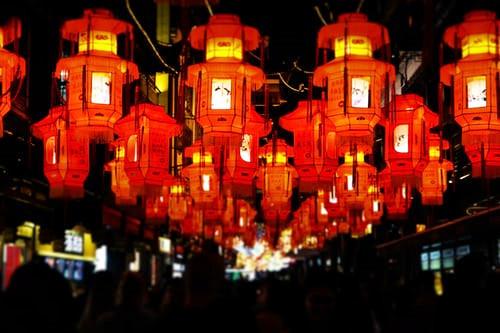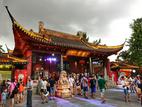People compare the Passover in Israel with the Lunar New Year in China when every Spring Festival arrives. Of course, this idea is a strategic need to educate non-believers but Christians should be clear and understand that although there are seemingly many similarities between the two festivals, the idea basically cannot stand scrutinizing if given careful consideration. Not only are they irrelevant, but they are even entirely contrary to each other.
Some people have made a list of the similarities between the Spring Festival and Passover, which is quite representative.
1. They are both the biggest festivals of the year and family reunions.
2. They are at the same time, which is the beginning of a year.
3. They have the same meaning: in China, it is "overstepping," and it is "over-passing" in Israel.
4. They are celebrated for the same reason: in Israel, it is avoiding "the one who kills," while in China, it is avoiding the legendary monster called "Nian" (meaning 'year').
5. They are of the same importance: to Chinese, it is passing the old year (which used to mean going through a hardship for the poor, particularly at the end of a year, in the ancient times as if they were moving through to the next level of a game, if not they would die); to Israelis, it is a matter of life and death.
6. They both have the same solution: Israelis paint blood (red) on door frames and Chinese stick couplets on each side of the outer door frames. Yet, the two peoples stay behind closed doors, and the whole family kept vigil until dawn.
This comparison between the Passover and the Spring Festival, though consistent, is suspected of being far-fetched.
Passover in Israel begins on the 14th evening between March and April of the Gregorian calendar. This is based on a passage in Exodus of the Bible. When Moses led the Israelites out of Egypt, God ordered the slaughter of lambs and smeared blood on the door so that when the angels who killed the eldest sons of the Egyptians could cross the door and call it "overstepping," and the Jews made this festival to commemorate it.
The next day is Unleavened Bread. Later Passover and Unleavened Bread were celebrated together. This is a holiday established by Jews to commemorate God's salvation and conservatism and give thanks to God.
However, when Christians commemorate it, they think that Passover is a preview of Christ Jesus. Because "Christ the Passover lamb has been slaughtered and sacrificed." (1 Cor. 5:7) On the red door frame is the blood of Jesus Christ on the cross, which forgives our sins and resists those who kill people.
This origin comes from the last supper between Jesus and the twelve apostles at Marco House. It was recorded in Matthew in the New Testament to commemorate Christ's Covenant with his believers with precious blood to be forgiven. This is also the direct source of Christian Holy Communion.
There were also two significant controversies in early Christian history until Passover was abolished at the Nicaea Conference in 325, and only Easter was observed.
The Spring Festival in China originated from offering sacrifices to gods and ancestors at the end of the Yin and Shang Dynasties (estimated more than 4,000 years ago, translator's note). This is the biggest traditional festival of the year in China. Beginning from the Wintry sacrifice of Laba in the lunar calendar or the kitchen sacrifice on the 23rd of the last month of the old year, the festival will last until the 15th of the first month of the new (Chinese) year. New Year's Eve and the first day of the first month are the festival's main events, which have been observed for more than 4,000 years. However, it was confirmed as a festival from the period of Emperor Wu of the Han Dynasty.
Whether it's sweeping away dust during the Spring Festival, watching the New Year, sticking couplets at the Spring Festival, playing firecrackers, drinking Laba (wintry worship) porridge, eating rice cakes, making dumplings, eating spring rolls and dumplings. The main content is to worship gods and Buddhas, pay tribute to ancestors, remove the old and place the new, welcome and pray for a good year.
During the Spring Festival, every day's activities have profound meanings related to ghosts and gods, seeking benefits and warding off evil spirits, hoping to make a fortune in the new year.
The Spring Festival presents four characteristics:
1. The family offers sacrifices to gods, ghosts, and ancestors.
2. Family reunion dinner.
3. Lively entertainment activities, such as lion dances, dragon lanterns dances, walking on stilts, farm dancing, and so on.
4. Visit relatives and friends. From a folk culture's perspective, the negative side of this series of activities is that it is full of folk superstitions, and idol worship is solemn, such as worshiping the kitchen god, the door god, the wealth god, the fertility god, and various ghosts and gods. They whip cattle to welcome the spring and pray to the gods for a good year, etc. On the positive side, there are sacrifices to ancestors, family reunions, new clothes, the old ones, and various entertainment in the Spring Festival.
Also, there is a folk legend about the so-called "Nian" (also meaning 'year'). It is said that there was a fierce monster named Nian, who went from village to village to find human flesh and mutilate living beings every 30th day of the twelfth lunar month. Once, the "Nian Beast" jumped into a town, which coincided with two shepherds whipping cattle in a competition. When the beast Nian heard the whipping sound, he was scared to run away. Fled to another village, it saw a red dress basking in front of a door. It was so frightening that it turned around and ran away. Later, the beast Nian ran to a house and saw the bright lights inside, which made him dizzy and ran away for his life. This was the origin of setting off firecrackers and pasting couplets, which meant using firecrackers and red couplets to ward off evil spirits and drive away from the monster Nian.
From the content of Passover and Spring Festival, Passover commemorates God's salvation. It is a day of confession to God and is a day of eating, drinking, and entertainment. Spring Festival is a custom festival. On this day, ghosts and gods from all walks of life can bow down, and everyone can relax, eat, drink and have fun through the festival. So the Passover and Spring Festival are different.
There is one thing in common in the moral of Spring Festival and Passover, that is, they both acquiesce in the existence of God. But the God in Passover is very clearly portrayed - He is eternal and unique, whereas the default gods in the Spring Festival moral are numerous, and this cognition of God is hazy and mixed. As Calvin said, it is only an "endowment of the human heart" in the understanding of God. This phenomenon is widespread in all ethnic groups of humanity. That is, "Heaven" and "God," which were recorded in ancient Chinese books, are the reflection and refraction of this "endowment of the human heart."
According to the Christian faith, this is a universal revelation from God to humanity. God presents this kind of revelation in nature, human heart, and experience or history. As David said: "The heavens declare the glory of God, and the sky announces his means." Before people fall into depravity, God also revealed himself to others by supernatural means in his work.
This is also the cause of some folk superstitions. If people want to know God, they must know God again and get this knowledge from God's special revelation.
The Passover in Israel was formed under the special revelation of God. God made his chosen disciples know him by his word Bible, the book of truth, and by some miracles. Christians are a group of people who receive his special revelation, eventually, get his redemption and renewal of life, and then move towards the eternity of life. If people want to leap from universal revelation to special revelation and genuinely know God, God's choice is naturally fundamental. It bears the brunt, but God's intention is often realized with the help of us Christians.
We should learn from the inner vigilance and confession of Passover, review the grace given to us by God, examine our shortcomings in the presence of the Lord, confess our faults to God, avoid indulging our desires and purify our hearts through festivals. In the real soul conflict and game, we use God's truth as a shield and keep our faith awake in the chaotic secular world without being humiliated by the material world.
- Translated by Charlie Li












